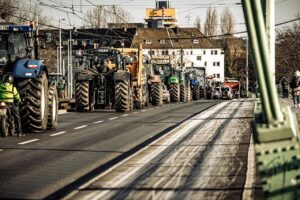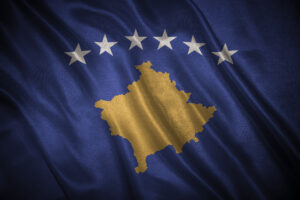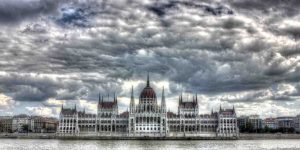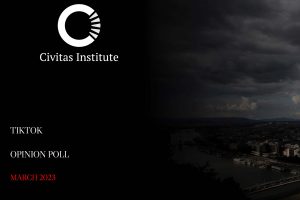
Pesticide changes are not enough to appease protesting farmers. The real problem is subsidies
After a great deal of bureaucratic drama, Spain has finally decided to recognize Kosovo passports. The UAE has also joined the party by removing visas for Kosovan citizens, allowing them to travel to the Arab state with only their passport for the first time. These are long-awaited changes which represent a big step forward in Kosovo’s relations with the rest of the world. But there is still much more to do – starting with the rest of Europe getting on board with visa-free travel for Kosovars and recognising Kosovo’s sovereignty.

Spain finally recognising Kosovo passports is a good start – but it’s still not enough
After a great deal of bureaucratic drama, Spain has finally decided to recognize Kosovo passports. The UAE has also joined the party by removing visas for Kosovan citizens, allowing them to travel to the Arab state with only their passport for the first time. These are long-awaited changes which represent a big step forward in Kosovo’s relations with the rest of the world. But there is still much more to do – starting with the rest of Europe getting on board with visa-free travel for Kosovars and recognising Kosovo’s sovereignty.

EU smoke and mirrors on vaping laws don’t help anyone
The EU is preparing to amp up its never-ending fight against smokers. Any plan designed to force people to make healthier lifestyle choices is bound

Israel Copes with Heartbreak & Trauma Following Horrific Terror Attacks
As Hamas unleashed the worst multipronged terror attack on the State of Israel in recent memory, many there are still trying to grapple with these unconscionable systematic murders, which have befallen the Jewish people.

Possible Change Means Relief in the Essential Oil Business
A new red-tape mission is about to worsen the lives of Eastern European consumers, producers, and suppliers. Under the influence of the Green Deal, the European Union’s Chemical Agency (ECHA) will transition to a hazard-based approachpremised on preventing any potential threat. Regulators will no longer focus on concrete exposure levels to determine whether a product is safe for consumers, as they used to in the older risk-oriented assessments. Instead, policymakers will use lab-related hypothetical scenarios or advanced statistical tests to label a consumer good as dangerous or remove it entirely from store shelves if it could constitute a problem in any way, shape, or form.

Eastern Europe should reject the proposed EU chemical regulations
A new red-tape mission is about to worsen the lives of Eastern European consumers, producers, and suppliers. Under the influence of the Green Deal, the European Union’s Chemical Agency (ECHA) will transition to a hazard-based approach premised on preventing any potential threat.

Warsaw’s Painful Jewish Chapters Spawn Modern-Day Proud Remembrances
In April 2021, to commemorate the 78th anniversary of the start of the Warsaw Jewish Ghetto Uprising, a monument was unveiled in the heart of the Polish capital that consisted of a glass cube above an underground chamber. This great touchstone in Warsaw had been a long-forsaken Holocaust-era archive that was hidden by Polish Jewish volunteers. The Ringelblum Archive, named after the leading historian and teacher, Emmanuel Ringelblum, “gave new life to those who died and the testimony of those who witnessed the horrors.

‘All the Red Lines Had Been Crossed’: CEA Talk with Finland Amb. Jari Vilén
In late March, the Hungarian parliament ratified Finland’s NATO membership, which led to joining it as a member a week later. At the time, some Hungarian officials “spent months telling counterparts that they had no objections, and their parliament was simply busy with other business,” as reported by Politico. “Budapest changed its narrative… with Prime Minister Viktor Orbán… arguing the point that some of his legislators had qualms regarding criticism of the state of Hungarian democracy.” While taking longer than perhaps hoped, the Hungarian parliament ultimately voted to ratify it by a margin of 182 to 6 on March 27.

Government Arrogance Defies Scientific Facts
The past three months have seen a surge in legislation regarding the Chinese app TikTok, mainly for security reasons; that is, the app is partly owned by the Chinese Communist Party (CCP). Starting with the United States and continuing with Canada, the European Union finally realized the apparent cybersecurity threat. From March 20, the Chinese app has been suspended from all corporate devices of the EU’s leading institutions.

Humanitarian Aid & Commitment Serve as Antidotes to Russia’s War
In September 2022, seven months into Russia’s war in Ukraine, donations across the globe were already flooding in to help this proudly defiant nation. Daria Rybalchenko, executive director of the National Network for Local Philanthropy Development in Kyiv, needed to change course at the time by raising awareness, generating funds, and materializing effective tools to best assist her country. At 25, Rybalchenko now brings over five years of work in the private sector, having already overseen successful projects in this war-torn country that has earned universal admiration for its grit and determination.

The other way
On the same day as the Hungarian prime minister’s State of the Nation address, important international speeches were delivered as well. There is a stark contrast between Obán’s words, and the communication of other European leaders.

Half the Population Thinks TikTok is Unsafe
The past three months have seen a surge in legislation regarding the Chinese app TikTok, mainly for security reasons; that is, the app is partly owned by the Chinese Communist Party (CCP). Starting with the United States and continuing with Canada, the European Union finally realized the apparent cybersecurity threat. From March 20, the Chinese app has been suspended from all corporate devices of the EU’s leading institutions.

Israeli Architect with Romanian Roots Flourishes in ‘Start-Up Nation’
As an Israeli whose family has Central European roots, Amir Rozei is a multidisciplinary architect with an exciting story. Upon graduating from Haifa University nearly a decade ago, Rozei’s career began auspiciously, landing an internship at the famed Daniel Libeskind Studio in New York City. For the past six years, Rozei has worked successfully ever since at one of Israel’s leading architectural firms.

Importance of Human Dignity Within an Often-Unjust World
The Sallux means “salt and light,” which can also be applied to the geopolitical sphere. “Sallux wants to spark a salted debate where needed and to shed light on the issues we face. Sallux presents solutions and will not stay on the safe side of the status quo. [It is] an association that acts as the political foundation for the European Christian Political Movement (ECPM). Formerly known as Christian Political Foundation for Europe (CPFE), [it] supports and underpins the ECPM, especially in terms of political content by Pan-European cooperation and the introduction of analysis, ideas, and policy options,” as is written on its site.

Made in China – Sold in China
For decades, we have been used to seeing almost everything we buy with the label ‘Made in China.’ It was convenient for every party, consumer and seller alike. However, lately Chinese tech products have caused quite a lot of concern in the free world.



